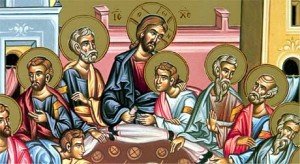The next second in the Creed is devoted to the Holy Spirit. Again, the Nicene Creed of 325 was added to. The Creed of Nicea simply stated: And in the Holy Spirit. The Constantinopolitan Creed of 381 added the words in Italics: And in the Holy Spirit, the Lord and Giver of life, who proceeds from the Father, Who with the Father and the Son together is worshipped and glorified, who spoke by the prophets. In one holy, catholic and apostolic Church; we acknowledge one baptism for the remission of sins; we look for the resurrection of the dead and the life of the world to come. Amen.
There are two separate issues in the Filioque controversy. First, the orthodoxy of the doctrine itself and the action of interpolating the phrase into the Creed. Although the debate over the orthodoxy of the doctrine preceded the question of the admissibility of the phrase as inserted into the Creed, the two issues became linked when the insertion received the approval of the Pope in the eleventh century.
Already in the fourth century the distinction was made, in connection with the Trinity, between the two Greek verbs ἐκπορεύεσθαι (the verb used in the original Greek text of the 381 Nicene Creed) and προϊέναι. In his Oration on the Holy Lights, St. Gregory of Nazianzus wrote: “The Holy Spirit is truly Spirit, coming forth (προϊέναι) from the Father indeed, but not after the manner of the Son, for it is not by Generation but by Procession (ἐκπορεύεσθαι)”.
The Fathers were very careful to use words which had significant meaning to express their belief about the Trinity. We who use English, I think, are not always as careful. The Greek is very nuanced. That the Holy Spirit proceeds from the Father and the Son in the sense of the Latin word procedere and the Greek προϊέναι (as opposed to the other Greek word ἐκπορεύεσθαι) was taught in the early fifth century by St Cyril of Alexandria in the East. The Athanasian Creed (probably of the middle fifth century) and a dogmatic epistle of Pope Leo I, (446 CE) declared that the Holy Spirit proceeds from both Father and Son.
The Eastern Fathers did not believe this to be just a matter of semantics. To them the words chosen to express our concept of God was very important and not a trivial and insignificant matter. The Filioque controversy was part of why the Great Schism.

